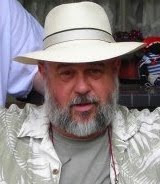As I've mentioned, the students who started the Southwestern Folk Festival were on a voyage of discovery, not a display of their expertise. They looked at what was going on in the rest of the country and came up with their own approach. The following is the welcome page, quoted in full, from the packet that was handed out to all attendees - even the title of the page is significant:
" Welcome Purists, Semi-Traditionalists, and People" by Sam Ontjes, festival director
"From everyone who worked so hard on the Southwestern Folk Festival to everyone who came - welcome! I don't think any of us realized how much work would be involved. To represent all phases of American folk music in a three day festival would be virtually impossible. The possibility of such an endeavor in three weeks would be unlikely. Furthermore, the festival planning committee is by no means a group of expert folklorists, but rather a group of highly interested students who want to know more about the rich and oftentimes neglected culture in which we live. Our goal has been to accumulate a representative sampling of American folk music with what limited resources we had, and to make it available to the public for the sake of instruction as well as entertainment.
"In doing this and trying to be honest, we ran into the same problem with which folk festival committees have been confronted from Newport to Monterrey - that is, agreeing on a definition of folk music. With all due regard to the serious folklorist and the ethnologist, we have deemed it necessary to broaden our definition of folk music to include all working songs, love songs, cradle songs, drinking songs, patriotic songs, dancing songs and narrative songs which deal with people in general. From the participants of this festival, you can expect to hear traditional as well as contemporary music. The purist might argue that nothing written in the last thirty years can be considered a folk song. The folk process, however, did not end thirty years ago. It continues today, in spite of automation, jet planes and Metrocal. During the recent "folk boom" , Big Bill Broonzy was asked if he considered all of the songs he was doing to be folk music. He replied with a grin, "I never heard a horse sing any of them". Along the same line, Pete Seeger has said, "Let's quit arguing and sing"."
"Whether considering a primitive Appalachian ballad or a more contemporary topical song, we hope you will accept the music for what it is - a segment of American history. You can expect to hears songs about all kinds of folk from all types of ethnic backgrounds. The average listener isn't expected to be wildly enthusiastic about everything he hears, but we hope he will listen. In this sense, the success of the Southwestern festival depends upon the listener. With your ideas and suggestions, we hope that this might become an annual event.
We're glad to be here, and we hope you're glad you came."
Forty years later, they're still coming. I think Sam and his fellow committee members should be right proud.
Tomorrow, another slightly more academic definition of folk music, taken from the same festival packet.
.
Monday, October 1, 2007
Subscribe to:
Post Comments (Atom)

No comments:
Post a Comment